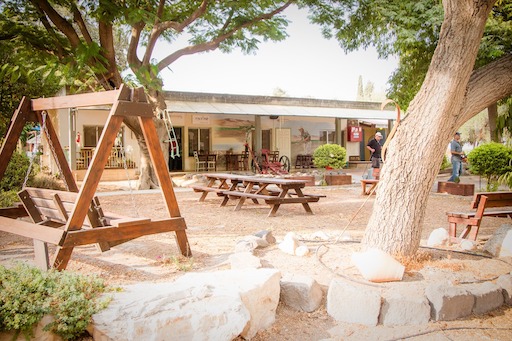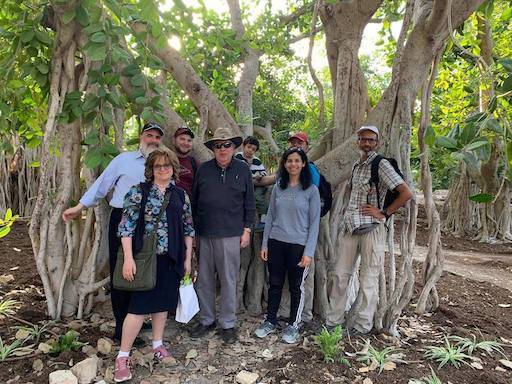Before we dive into a brief, cool and refreshing review of Kibbutz Sde Eliyahu, a religious cooperative kibbutz in the Valley of the Springs near the city of Beit Shean, just a word about pigs – Honzir (in Arabic).
Ein Honzir (the spring of the pigs) is a magical spring in the fields of the kibbutz whose waters flow into a large and wonderful pool. The name of the spring, which is derived from the fact that it was a wildlife paradise and especially for wild pigs (boars), did not settle well with the Jewish settlers. So they switched it to “Ein Nezem” (The spring of the nose ring), based on the biblical verse from Proverbs 11:22 – “As a jewel of gold in a swine’s snout.” That is, even the most beautiful ring will be unclean and ugly in a pig’s nose.
However, this wonderful spring was and remains a beautiful jewel in the kibbutz fields and the members of the kibbutz today insist on calling it simply Honzir.
In recent years, Ein Nezem / Honzir was “discovered” amongst spring enthusiasts and has begun to suffer from the damage of tourism.
From wildlife and environmental hazards we move naturally (and organically) to insects and pest control.
Kibbutz Sde Eliyahu, established as part of the “Stockade and Tower” settlements, is a pioneer of organic agriculture and biological pest control in Israel. A large part of the kibbutz’s fields are cultivated using organic farming, the kibbutz established the first biological pest control company in the country, BioBee, a leader in its field at an international level. Kibbutz Sde Eliyahu also has a plant for organic compost production and a spice drying plant. The kibbutz attests to themselves “acting out of faith and choosing a sustainable way of life, out of a desire to strengthen and instill this worldview in others.”
What more? Kibbutz Sde Eliyahu has the Bio Tour tourist center that specializes in tours in the field of organic agriculture and biological pesticides, a “Cafe in the Field” cafe, a store for local organic produce and a dining room open to the general public.
The paths of the kibbutz are bustling with young people. Along with the locals, Kibbutz Sde Eliyahu houses the “Adamat Shamayim” yeshiva and the “Habayta” campus for young people from abroad and lone soldiers (it houses up to 52 lone soldiers and 30 “Ulpanists” learning Hebrew!) No wonder over 20 couples / families in the kibbutz are a result of the connections made on the kibbutz.
Lastly, a word about the late Mario Levy (whose figure is painted on the cafe wall in the picture). In the 1960s, Mario was in charge of the kibbutz’s vegetable garden. The increasing use of pesticides and the emergence of immune pests bothered him so much that he sought special permission to fly to Switzerland and study organic farming. But, upon his return to Israel, when he enthusiastically tried to disseminate the knowledge he had acquired, he encountered a wall in the form of the Ministry of Agriculture. He did not give up and eventually the kibbutz allocated him an area of 200 dunams for organic crops.
Years later, in 2008, Mario Levy was awarded the Lifetime Achievement Award in Agriculture by the Plants Council. In their justification for awarding the prize, it was stated: “Despite the opposition he encountered at the beginning of the journey, he strongly believed in organic agriculture and pushed with all his might to promote and develop this agriculture in Israel. Mario Levy saw organic agriculture as a real and possible alternative to traditional agriculture and worked for decades to maintain it, while adhering to every ingredient and without sacrificing the crop of produce and quality… Mario came everywhere, explained, taught and persuaded, and the result was not long in coming: carrots, radishes, apples and dates, organic, were exported to Europe and sold at impressive prices.
So the next time you buy organic produce or prefer biological pest control solution over chemical sprays, say thanks to Mario and Kibbutz Sde Eliyahu who’ve paved the way for Israeli organic farming.
And if you end up taking a refreshing dive into Ein Nezem / Honzir, remember to take care of this jewel nestled in Kibbutz Sde Elihau’s fields. If too many pests and environmental hazards are discovered there, these kibbutzniks imbued with faith, may develop a biological solution to eradicate tourists.


